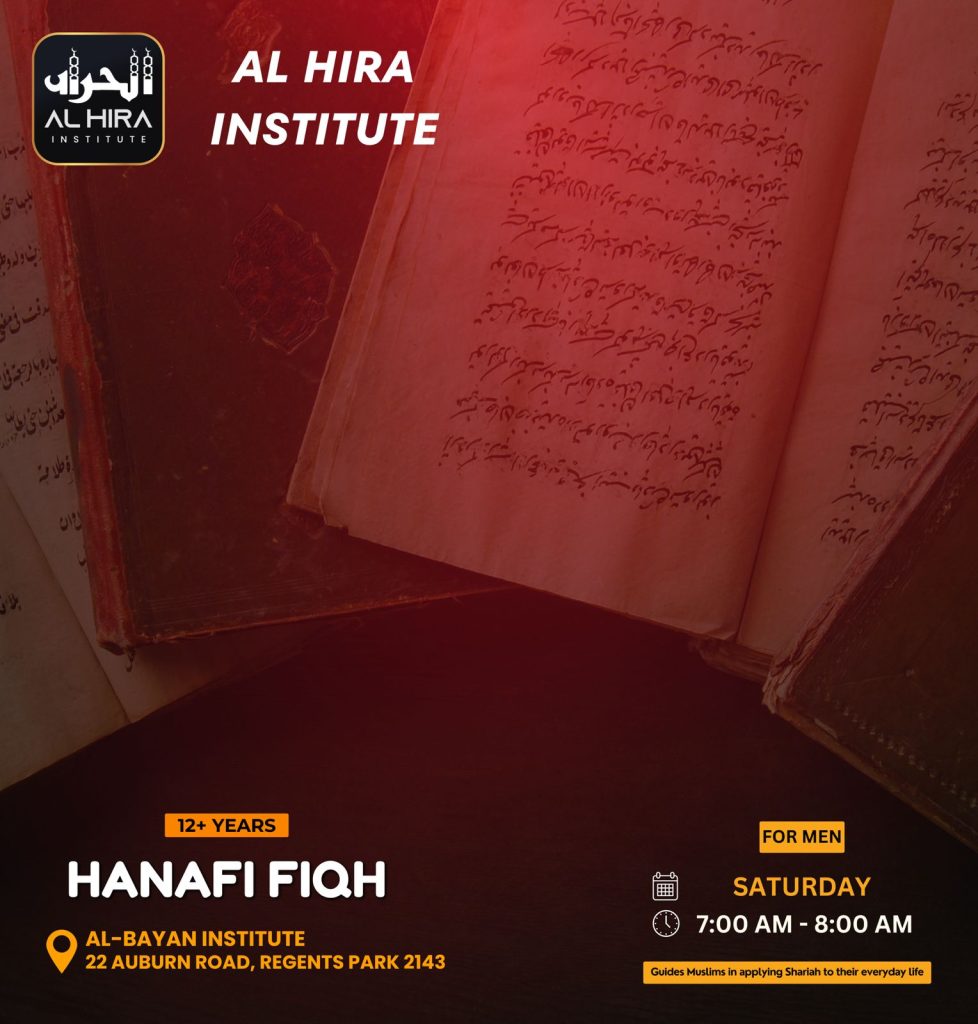HANAFI FIQH

HANAFI FIQH
The “Hanafi Fiqh” course based on the Nurul Isbah book is typically designed to offer a structured and comprehensive understanding of Islamic jurisprudence according to the Hanafi school of thought. Nurul Isbah is a well-known text in the Hanafi tradition, primarily focusing on legal rulings related to worship (like prayer, fasting, zakat, and hajj), social transactions, and other aspects of daily life. It’s often used as a guide in madrasas or Islamic learning institutions.
- Title: Hanafi Fiqh
- Instructor: Mufti Asad Ali Shah
- Time: 7:00 AM – 8:00 AM
- Recurring every Saturday at 7:00 AM
- Duration: 1 Hour
- Location: 22 Auburn Road, Regents Park NSW 2143
- Contact Info: [email protected]
If you’re looking for an outline of what such a course might cover, here is a general structure based on the contents of Nurul Isbah:
Course Outline on Hanafi Fiqh Based on Nurul Isbah
Module 1: Introduction to Fiqh and Hanafi School
- What is Fiqh?: Understanding Islamic jurisprudence and its sources (Quran, Hadith, Ijma’, Qiyas).
- Overview of Hanafi Fiqh: A brief history of Imam Abu Hanifa and the development of the Hanafi madhhab.
- Importance of Fiqh in daily life: How Hanafi fiqh influences personal worship and societal transactions.
Module 2: Basic Concepts in Hanafi Fiqh
- Rulings in Islamic Law: Obligatory (Fard), Recommended (Mustahabb), Disliked (Makruh), and Forbidden (Haram).
- Conditions of Valid Acts: Purity, intention (niyyah), timing, and the subject matter (e.g., the person or the item involved in an act).
Module 3: Purification (Taharah)
- Types of Purification: Wudu (ablution), Ghusl (ritual bath), Tayammum (dry ablution).
- Rules of Wudu: How to perform wudu, nullifiers of wudu.
- Ghusl: When it is required and how to perform it.
- Menstruation and Postpartum Bleeding: Fiqh rulings related to women’s purification.
Module 4: Prayer (Salah)
- Obligatory Prayers (Fard): Daily prayers (Fajr, Dhuhr, Asr, Maghrib, Isha).
- Sunnah Prayers: Voluntary prayers before or after the obligatory ones.
- Conditions for Valid Prayer: Facing the qiblah, purity, covering the awrah, etc.
- Imam and Followers (Ma’mum): The role of the Imam and the follower in congregational prayers.
- Prayer Provisions for Women: Specific rulings for women’s prayer and their participation in congregational prayer.
Module 5: Fasting (Sawm)
- Conditions for Fasting: The time frame of fasting, invalidators of fast.
- Obligatory Fasting (Ramadan): How to fast, exceptions for those who are sick, pregnant, etc.
- Voluntary Fasts: Fasting on Mondays and Thursdays, the 13th, 14th, and 15th of the month, etc.
- Zakat al-Fitr: Charity given at the end of Ramadan.
Module 6: Zakat (Obligatory Charity)
- Conditions for Zakat: Who must pay it, and the amount due.
- Types of Wealth Subject to Zakat: Gold, silver, cash, agricultural products, etc.
- Distribution of Zakat: To whom zakat can be given.
Module 7: Hajj (Pilgrimage)
- Conditions for Hajj: Who is obligated to perform Hajj.
- Rituals of Hajj: The journey, ihram, tawaf, sa’i, standing at Arafat, and other rites.
Module 8: Transactions (Mu’amalat)
- Types of Contracts: Sale, lease, gift, etc.
- Rules of Buying and Selling: Riba (interest), Gharar (uncertainty), and fraud.
- Marriage and Divorce: Conditions of a valid marriage, the rights and duties of spouses, the process of divorce.
Module 9: Fiqh of Personal Matters
- Inheritance: Distribution of inheritance according to Islamic law.
- Endowments (Waqf): Rules regarding the establishment and management of a waqf.
- Testaments (Wasiyyah): How to make a will, who can inherit, and how much they receive.
Module 10: Contemporary Issues
- Modern Applications of Hanafi Fiqh: How Hanafi fiqh addresses contemporary issues, including banking, modern transactions, and international relations.
- Fiqh and Social Justice: Gender issues, poverty, and the role of the Islamic state.
© AL-HIRA Institute - Copyright 2024.
